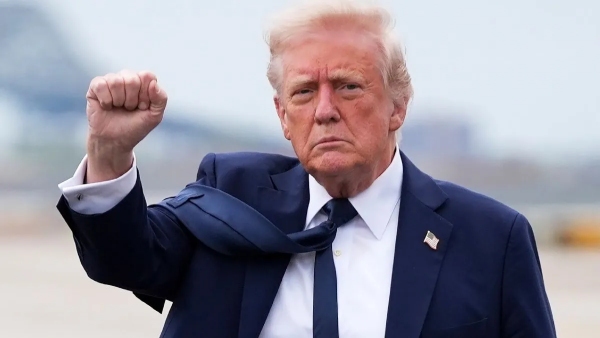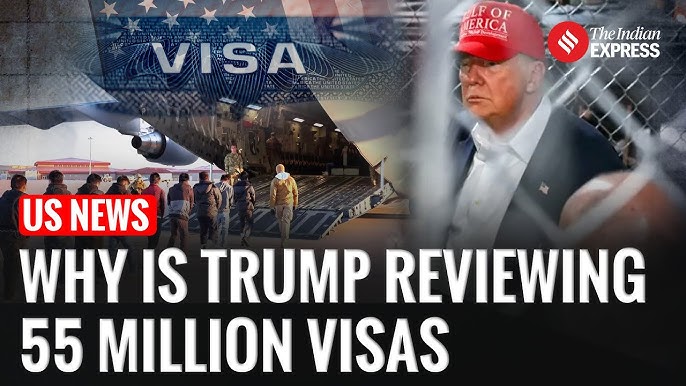The question Why is Trump Reviewing 55 Million Visas? has captivated global attention. As of August 21–22, 2025, the U.S. State Department, under the Trump administration, embarked on an unprecedented initiative: a sweeping review and re-vetting of more than 55 million current U.S. visa holders, spanning tourists, students, temporary workers, and more. This move, a bold escalation of immigration enforcement, raises urgent questions about national security, rights, administrative capacity, and geopolitical implications.
In this deep dive, we’ll unpack the what, why, how, and what next, offering a thought-provoking, richly sourced, and nuanced perspective.
1. What’s the Scope of the Review?
The Trump administration has initiated a comprehensive vetting operation involving all individuals holding valid U.S. visas, estimated at over 55 million people globally. These include tourists, students, business travelers, temporary workers, and more—not just those currently in the U.S. but also individuals outside the country with multiple-entry or long-term visas.
This operation is anchored in a policy dubbed “continuous vetting,” where visa holders are continually monitored using law enforcement data, immigration records, social media, and broader behavioral indicators.
2. ** Why Is Trump Reviewing 55 Million Visas?**
National Security and Public Safety
The administration frames the initiative as a preventive measure to detect and deter overstays, criminal activities, threats to public safety, terrorist links, and other forms of ineligibility that may arise after visa issuance.
Social Media & Ideological Scrutiny
The continuous vetting extends into analyzing applicants’ and visa holders’ social media to identify “anti-American” behaviors, including promotion of antisemitic ideologies, support for terrorism, or content perceived as hostile to U.S. values.
Administrative Consistency and Retrospective Accountability
Visas are traditionally vetted at issuance, but officials now emphasize that any information emerging post-issuance—such as criminal records or intelligence—warrants reevaluation and potential revocation.
Political Strategy and Immigration Control
Observers note the move dovetails with the broader immigration crackdown under Trump’s second term, signaling a political strategy to appeal to his base via tough, expansive enforcement.
3. ** Mechanisms & Implementation**
Continuous Vetting Tools
The State Department is mining disparate data sources—law enforcement, immigration, IRS tax records, and open-source intelligence (including social media)—to flag potential issues after visa issuance.
Social Media Scrutiny & Device Access
Officials are actively monitoring visa holders’ social media for ideological red flags and may require unlocking electronic devices during interviews to facilitate searches.
Revocation and Deportation Triggers
Visas may be revoked for overstays, criminal offenses, security risks, or ideological disqualifications. If holders are in the U.S., revocation can lead to deportation.
Halt on Worker Visas for Truck Drivers
In parallel, the administration suspended issuing worker visas for commercial truck drivers, citing both safety concerns and competition with American truckers.
Student Visas Already Revoked
Since January, over 6,000 student visas have been revoked for legal violations like DUIs, assault, and alleged terrorist support; 200–300 of those were attributed to terrorism-related concerns.
4. ** Potential Impacts**
Legal and Ethical Concerns
-
Due Process & Privacy: Critics argue that continuous vetting, social media monitoring, and retrospective revocation erode civil liberties and privacy protections, especially when ideological criteria are used.
-
Discrimination Risks: Scholars warn of bias, including racial or religious profiling—particularly as monitoring intensifies in communities whose views may not align with prevailing political sentiments.
Immigration Flows & Business Disruption
Stricter enforcement and uncertainty may deter students, tourists, skilled workers, investors, and others—harmful to universities, labor markets, and industries reliant on international talent.
Diplomatic Repercussions
Issuing countries may retaliate with stricter visa requirements for Americans, blocking data access, or lodging formal diplomatic protests.
Administrative Overload
Reviewing 55 million cases is time-consuming, resource-intensive, and may strain government capacity. Julia Gelatt from the Migration Policy Institute questions whether it's feasible or valuable to review visa holders who may never return to the U.S.
Political Fallout
While supporters may view the move as reinforcing sovereignty and lawful migration, critics see it as extreme and discriminatory—adding fuel to political polarization.
5. ** Contextual Backdrop**
Comparison with Past Measures
Previous Trump-era policies targeted specific visa types (e.g., H-1B, Muslim-majority country travel bans), but none were so sweeping. This broad approach marks a significant policy escalation.
Reform Proposals
-
The RAISE Act proposed deep cuts to legal immigration—including eliminating the diversity lottery and shrinking family-based pathways—but did not involve retrospective visa reviews.
-
Trump’s proposed Gold Card investor visa offered residency for a $5 million investment, targeting affluent individuals. This contrasts with mass surveillance; it's a forward-looking economic pathway, not retrospective enforcement.
6. ** Why the 55 Million Number?**
The figure includes all individuals globally with visas—not just those in the U.S. It encapsulates tourist, business, student, visitor, and temporary work visas issued over time—and may overlap with other categories like green card applicants or naturalized citizens in some reporting.
This figure is distinct from the ~2 million actually present on visas at any given time. As pointed out by commentators:
“...the total number of people in America on visas is just over 2 million, not 55 million. They're listing the total foreign-born population including green cards, naturalized citizens, undocumented and visas.”
Still, official sources affirm the State Department's estimate of 55 million individuals subject to review.
7. ** Summing Up: What Should Readers Take Away?**
-
What: A sweeping, government-wide re-vetting policy targeting all U.S. visa holders worldwide.
-
Why: Framed as a national security imperative; potentially political strategy to showcase enforcement.
-
How: Through continuous vetting, including social media, law-enforcement data, and device searches.
-
Impact: Major legal, ethical, diplomatic, economic, and mobility consequences.
-
Broader Significance: Reflects ongoing attempts to reshape U.S. immigration, positioning it as more selective, enforcement-heavy, and ideologically aligned.
Why is Trump Reviewing 55 Million Visas? — The Core Answer
In short: Why is Trump Reviewing 55 Million Visas? Because the administration has launched an expansive initiative—called “continuous vetting”—to retrospectively assess visa holders globally for any violations such as overstays, criminal activity, public safety risks, or ideological ineligibility, including social media scrutiny and potential anti-American views. The goal is to enhance national security, enforce immigration law strictly, and signal a zero-tolerance posture on deviance, even if the logistical, legal, and ethical ramifications are profound.
Final Reflections: Expert Perspective
From an Expert standpoint, this policy represents one of the most sweeping immigration enforcement measures in modern U.S. history. Its scope across millions, inclusion of ideological vetting, and retrospective nature are alarming in scale.






